Issue No.18 / November 16-30,2015

‘Thanks to my mother, my upbringing, despite being in small town Ballia, was very modern and broad-minded. My mother was instrumental in guiding and ensuring all her five kids got the best of upbringing, whether in terms of imbibing the right values, culture or studies’
YUVARAJ SRIVASTAVA, Chief Human Resource Officer, MakeMyTrip.com made good use of his early lessons while training to be an Army Officer and tough assignments in the Armed Forces to tackle even the most difficult situations in the corporate world, turning them into successful stints – be it at Asian Paints, Oberoi Hotels, PepsiCo India, or now, MakeMyTrip. CORPORATE CITIZEN gets some close-eye-views into his eventful journey
Yuvaraj Srivastava, Chief Human Resource Officer at MakeMyTrip. com is an HR professional with 18 years of Corporate HR experience. A commissioned officer with the Indian Armed forces for five and a half years, he then made a successful foray into the corporate world with renowned companies like PepsiCo India, Th e Oberoi New Delhi and Asian Paints.
He worked with Asian Paints Ltd for around nine years, serving in different roles across levels. Aft er completing three years with Th e Oberoi, New Delhi as Director HR, he joined PepsiCo India in 2010 as VP- HR for the West Market,later moved to PepsiCo Foods business as Head of HR for All India Sales and Org. Capability building. In July 2013, he moved to a larger role within PepsiCo to lead Org. Capability for PepsiCo India Region. Currently he is the global CHRO for MakeMyTrip, responsible for HR strategy and business partnering for the company and all its overseas subsidiaries. He is an MBA in HR from IMT Ghaziabad and graduate in Industrial Psychology from the University of Allahabad.
Earlier in his career while with Asian Paints, besides handling welfare and people related engagement initiatives, he was involved in strategic IR interventions and statutory compliance to ensure disruption free operations. He had extensive exposure to various employment related statutes ranging from laws governing working conditions to employee relations. His role at The Oberoi New Delhi included delivering on the people front by ensuring employee engagement initiatives tailor made for various profiles, handling employee employment life cycle, culture building and productive IR atmosphere. Exposure in the manufacturing setup, the service industry and MNCs in the FMCG space has helped Srivastava get an all-round perspective of all domains of operational and strategic HR.
Yuvaraj Srivastava speaks to Corporate Citizen about the exposure he got both in the Army and the corporate world from the time of his intense training and exposure as a young Army Officer in the 66 Field (later converted to medium) Regiment in the Artillery and his impressive stint in the corporate world, linking his success to the tough training he received in formidable field postings
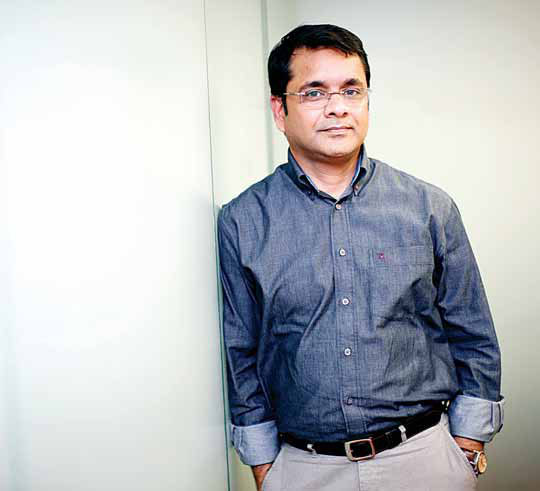
‘You have to get up at 4.30 am and sleep only at 11 pm. You have a 10 km run with a 18 kg pack on your back. The second week you have to do 20 kms, and the third week, a 45 km run with a 18 kg pack on your back. And in the six weeks’ training, you also do at least four or five overnight navigation marches. You leave at 4 pm and come back only the next day at 8 am or 9 am, navigating independently, through the thick Belgaum jungles. You can’t see one metre beyond you and you have to carry on with only your compass and weapon’
In fact, the Muir Hostel where I stayed in, which is also known as Dr. Amar Nath Jha Hostel, is an elite hostel which produced atleast 15 to 20 civil servants each year until the late eighties. Once you get admission into this hostel, you were considered 50% civil servant, and the rest 50% depended on how you developed yourself. Getting admission there was my first achievement, as, at the outset, I was not called for the interview for that hostel and I was pretty disappointed. I was, however, determined to get in. So when that interview was happening at the hostel, I went around asking all the candidates waiting there their marks in the Std X or XII Board examinations. When I realized that there were some students who had marks less than me in the entrance examination, I wrote an application on a piece of paper in my own style and sent it inside to the social secretary of the hostel and to the warden. After 20 minutes I saw Social Secretary of the hostel somebody coming out and asking who Yuvaraj Srivastava was. I went there and said it was me and he said, fine, you wait here, I also want to meet you aft er all these people are met. I had an interview for 40-45 minutes. A lot of questions were asked and finally, the end result was that I became one of the 15 people selected for admission to the hostel. So that was my first victory and confidence-making exercise.
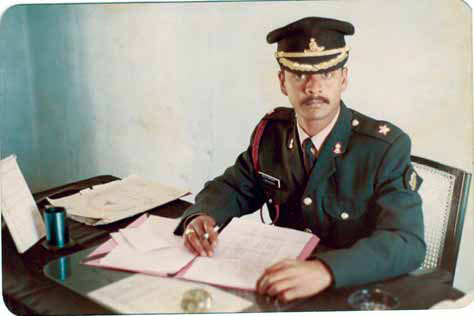
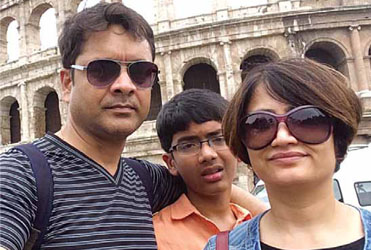
So, after five days of the selection process in Bhopal, I was one of the two candidates selected out of some 70 candidates. The other candidate was Ajmer Singh from Chandigarh. I was delighted that I had been selected for the Army. I think that was a big high in my life and I was just nineteen-and-a-half years and my graduation results were not even out. I called my parents, I called my friends. That was in 1990. The Officers Training Academy (OTA) Chennai was to be my training centre.
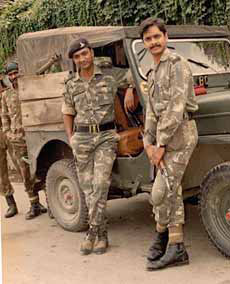
The ten month training in Chennai was arduous but being a sportsperson, I was able cope up well with the physical rigour. Some cadets backed out because they couldn’t sustain the rigour of Army training. But for people like us who come from a modest background , a career was very important. For an upper middle class family, there is nothing called ‘you can’t do this’ because you can’t sustain the vagaries of the overall routine. You have to do it because that is what you are expected to do. So it never came to my mind that I could not do it. I said, come what may, whether it is a 20 km run, or a 5-km run, or having your shin fractured towards the end of the training, I would still continue with the training. I was not a swimmer, so it was a big challenge for me to learn swimming. So the whole life pattern changed. Th e sheer zeal to really excel and not show people that I could not do something became my mission.
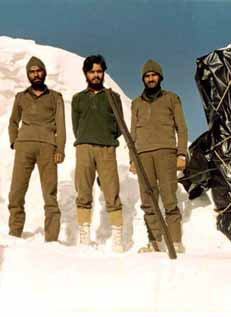
Th ere were many such occasions when my body gave up. A lot of times, situations arose that left me disappointed. While I was training, in May 1991, my only sister was getting married and I had played a big role in making it happen. Her in-laws too were very fond of me, but because the marriage took place when I was in the Academy, I could not attend it. I came to know that you could get special leave for such occasions but when I asked one of my commanders, he said you have to decide whether your career is important or attending your sister’s marriage is important. And I never went back and asked again. I felt very regretful since I could have pushed further and got the leave. But at that time I did not have enough exposure to government processes and systems. All I knew then was that I should only be following the instructions of the authorities.
So, did the training in the Army, transform your personality?
Army training is ingrained with very strong ethics and processes. It has a very specific and strong principle of ‘country first’ and doing everything so that you become a strong soldier. And when you are a strong soldier, your sensitivity to emotions, which are worldly, need to be slightly moderated. Your ability to follow instructions without questioning needs to be very high because you follow instructions at times of war. I never felt bad about it.
‘HR is about delivering productivity to the organisation, managing the performance of the people and creating an enabling environment for people to do their best. In certain industries, people bring out their best when they are put in processes and if they are trained well. In e-commerce, the best comes out of people when they are having fun, because it has more to do with innovation and creativity.’
‘The Army also teaches you to be adaptable. If you have been born and brought up in a society or in a place which is very basic in its structure, it doesn’t make you arrogant. It makes you humble. When it makes you humble, then anything that you get in life, you feel is due to God’s grace and the blessings of the people rather than your own doing.’
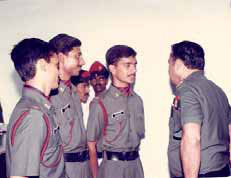
My wife spent one-and-a-half months with me in Jhansi aft er her bidai and then the train took all of us who belonged to the 66th Field Regiment to Pathankot. She was also with me in same the train, and I dropped her at Datiya, a place in Madhya Pradesh, to her Bua’s place. And she could only stay with me for one and half months, and this after six-seven years of knowing each other.
You were part of the anti-insurgency operations in 1993. Please tell us about that. Yes, in 1993, we went to the Valley. We were asked to go to Siachen, but when we moved from Jhansi, we got instructions from the Army Headquarters that there was an insurgency and the whole battalion instead of going to the LoC, should stay put in Srinagar. We were required to carry out counter insurgency and anti-terrorist operations. So I worked in all the areas in Srinagar, like Pattan, Gandarbal, Kupwada and Baramulla. I have seen all the areas at the age of 22. I was involved in a lot of skirmishes with the militants. I have had plenty of interaction with the public as well as civil society and I also worked for five months on the Uri border, which India shares with Pakistan. I was deployed there for five months as the artillery officer supporting the firing of long-range guns. So my experience in the Army was very intense.
No, my wife was at Allahabad, continuing with her education. After that she came to Delhi and began working with Usha India. We could not stay together after marriage for at least four and a half years. And when we returned from Srinagar in 1996, we came back to Dehra Dun on a peace posting, and that’s the time when we started staying together. In ’96 I came to Dehra Dun and ’97 August – September I left the Army and came to the Corporate world.
Five and a half years, but if you include the training period it was six and a half years. I left as a Captain, having joined the Army as a Second Lieutenant
Yes. As an artillery officer, it is not mandatory for you to do commando training, whereas as an infantry officer, you are supposed to do it. When I reached my regiment in Jhansi in 1992, I was told by my Commanding Officer that there was one course nomination for commando training and my senior officers decided to nominate me because I was the youngest. Th at was in December 1992. I did my training in the Commando Academy in Belgaum for 40 days and passed out successfully. Th is was a 35-45 days’ training course which no sane human being can go through and pass out. You have to get up at 4.30 am and sleep only at 11 pm. You have a 10 km run with a 18 kg pack on your back. The second week you have to do 20 kms, and the third week, a 45 km run with a 18 kg pack on your back. And in the six weeks’ training, you also do at least four or five overnight navigation marches. You leave at 4 pm and come back only the next day at 8 am or 9 am, navigating independently, through the thick Belgaum jungles. You can’t see one metre beyond you and you have to carry on with only your compass and weapon.
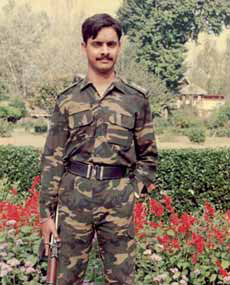
I always knew I was good at handling teams and working in an environment where you have to network and work with a lot of people. And aft er three years’ exposure in Srinagar, I saw the need for a bigger canvas. If I do well, I should get promoted quickly, why then should I wait for 18 years to become a Lieutenant Colonel? In 1996- 97, the economy was opening up, with a lot of opportunities for faujis in the private sector. So all these put together, along with the fact that my wife, an MBA, was working in Delhi, in the vicinity of Dehra Dun where I was posted, helped me take a call. I thought that I would be a very happy person if, at the age of 40-45, I could become a senior corporate leader, settled with my own house in a place like Delhi or Mumbai. This would help in family stability and my wife could also continuously work in one place, without giving up her job or getting posted from place to place. And my son would also have a very steady education in one institution, rather than jumping from one place to another. All this put together, I felt that it made sense for me to leave the Army. It was time to look for a bigger canvas and that bigger canvas was provided to me by Asian Paints my first corporate job.
I joined there as an executive in the personnel department in 1997 and I was posted in a factory. Employee welfare, contract labour, statutory compliances, Safety, Administration, were part of the portfolio. In the initial phase at Asian Paints, I did not have any Manager and Pure HR colleague and this gave me huge opportunities to learn and develop.
I was based in Asian Paints, Noida. It was a factory which had a history of strikes, lockouts and assaults. It was indeed a difficult assignment to handle. Being from a fauji background, I didn’t know what would be there on the plate for me. I realised that this position was offered to a lot of people, but they did not take it because they realised that was in Kasna, in Greater Noida, infested with land mafi a, undisciplined youngsters, criminals and so on. They never allowed people to settle down there. When I started working I realised that the personnel department was not very stable. I was in charge of two portfolios – one was Admin plus Employee Welfare and Contractual labour. Th e other portfolio used to be typically HR, like recruitment, training and the like. I used to be the only stable factor out there; the others kept changing because they could never get adjusted to that environment.
The ability to be honest and loyal to the organisation has come from the Army. Anybody talking ill about the organisation, or thinking of creating problems in the plant was, I will not say my enemy, but definitely not someone on the right side. I have always been very action-oriented, and I loved to work in such environment.
Th e Army also taught me to be closer to my men. In the Army, you sleep alongside your men if you are in the field area. It is not that aapka sahib hai to kahinaur so jaega. I have slept alongside my men in the same three by three or four by four feet tent. In the Army, I have also learned that every individual has personal self-esteem and one needs to respect that. And the general courage to face tough situations came from having been in the Army. So against all odds, working in the midst of a hostile environment with goons and criminals—I was also assaulted in the plant once in 2000 in Asian Paints did not deter me from doing the work I was supposed to do. The whole plant got transformed aft er 2000, and in 2003 I moved out from there. I was dealing with that plant for five years, and I was promoted twice during that time.
From there, in 2003, I got promoted as the Head of plant, HR, for the Bhandup plant, Mumbai That’s the time when the company said, ‘Great job done; he should be promoted and given a bigger responsibility’. So I went to Mumbai, where again there were a lot of stories. I worked with NCP unions, Shiv Sena unions, etc. Being from the North, I had to struggle to understand the language and work with them in the beginning.
I stayed there for three and a half years. People still remember that some transformational work happened during my tenure. From there, aft er nine and a half years in manufacturing, I came to Oberoi Hotels. I realised that in the nine and half years I spent in manufacturing, I worked a lot with the unions, where things were done differently. I needed to do a bit of softer HR in the hospitality sector.
The Army also teaches you to be adaptable. And if you have been born and brought up in a society or in a place which is very basic in its structure, it doesn’t make you arrogant. It makes you humble. When it makes you humble, then anything that you get in life, you feel is due to God’s grace and the blessings of the people rather than your own doing.
‘When you go into the hospitality industry, you have to start looking at your employees differently, because employees are your ambassadors there. If they have good interaction with the customer, it creates a very positive impact.’
Oberoi was a good experience. After manufacturing, it brought me to the soft er side of HR. When you are in manufacturing, when you are working with workmen and the union, you always approach things with a doubt: If employees are asking for this, the union is asking for this, what is the motive behind this? Why are they asking this? And then your HR becomes very different, your lens become very different.
When you go into the hospitality industry, you have to start looking at your employees differently, because employees are your ambassadors there. If they have good interaction with the customer, it creates a very positive impact. So you have to keep them happy. And you have to believe in them. You have to be very sure that you put your trust in your employees and let them get what they want and ensure they are delighting customers. You empower them very heavily. So that was the change.
I served at Oberoi till March 2010. I was the Director- HR with Oberoi, New Delhi. I was the HR for the entire property. I headed a team of 15 people, which was a good experience and aft er being in HR in the areas of manufacturing and hospitality, the only thing left was to work with a multinational because both these companies I had worked for were Indian. So as a God-given opportunity, I got an offer from PepsiCo, which is the best FMCG company, and one of the biggest multinationals employing best practices. I was picked up to be VP of human resources for the western and the central market for their beverage business. I was based in Mumbai and then I went back to Delhi, working with PepsiCo. I spent four and a half years with PepsiCo and did three roles: I had a role in the beverage business; I was the VP of human resource for the all-India sales team for the foods business; and then I was the Director- Organisation Capability for the India region. So, the last role was for the entire India region, where I was a part of the HR leadership team and I used to draw the agenda for learning development and capability building for the India region.
It is important that you get exposed to different types of industries. After the multinational PepsiCo, one thing which was missing in my overall portfolio was technology and e-commerce. After spending four and a half years in PepsiCo, I was fortunate to get an opportunity to work with MakeMyTrip as its Chief Human Resources Officer, in May 2014. Started in 2006, MakeMyTrip is a pioneer in e-commerce in the domain of online travel. It has been a great opportunity for me to learn technology, understand technology profiles and people and also understand the e-commerce field, which is set to boom in the next 10-15 years. It is a business field which will offer huge career opportunities for business and growth in the country. I have been with MakeMyTrip for almost 18 months and it has been a good journey, where I learn new things every day. So from manufacturing to hospitality to FMCG and to Indian online travel, technology has been the best option for me.
Here, the knowledge workforce is your biggest resource. They are the ones who basically contribute directly to the business. So any technology guy doing great innovation or creating a great product contributes greatly to business overall. Till my PepsiCo tenure, I used to work with people who would sell products and it was the product that was the revenue generator. At MakeMyTrip, revenue is generated with the help of the best of innovations. It is important to understand that currently the technology workforce is in huge demand. Business is booming and there is huge requirement for the best of the talent. As you work with them, it is very important that you are very close to them, understand their needs and retain them. It demands that you understand the market and at the same time your own people. How you make things simple, how you ensure that you understand their needs with a flexible approach, is what helps retain people.For a tech company it is also important how you cut red tape and achieve speed in terms of delivery.
HR is about delivering productivity to the organisation, managing the performance of the people and creating an enabling environment for people to do their best. In certain industries, people bring out their best when they are put in processes and if they are trained well. In e-commerce, the best comes out of people when they are having fun, because it has more to do with innovation and creativity. It has also more to do with age and the overall workforce that you have. So how to create an environment that is informal, fun at work, an open workplace culture which brings big productivity to the organisation is the challenge. While you use different levers in different organisations, your end output has to be a productive workforce which contributes to the bottom line of the business. And in e-commerce, productivity comes by letting people have what they want, letting them be themselves, and through that you drive innovation, productivity.
Th is is how you create a workplace which is right in terms of culture to deliver a business objective.
People working in the e-commerce industry have an average age of around 28 years. We have flexi work timings in the sense people can come in anytime between 9-10 am. We have attendance for payroll purposes and not for monitoring or policing. This is how you create an environment which is empowering for them, where accountability is important.

Secondly, you have to allow them to have their social life. With previous generations, people had very limited options for socialising. Today, the whole world has changed. Social media has given access to people at the click of the mouse and youngsters get energised by their social network. And if you allow them to get energised through these interactions, permit them to leave early from work, provide flexibility of work time, or allow them access to social networking sites, it all helps them feel at home and get energised to perform better. So it is important to allow them social networking opportunities rather than constraining them. It should not be that you come to the workplace and now you are eight or nine hours in a different world altogether. Instead let there be a seamless transition from home to office and from office, back to home. If you do that, it works.
Thirdly, if you have to work with this generation and get the best of productivity, it is important to give them feedback. They love to get feedback. They want to get instant input that what they have done is good or bad. They are not apprehensive of getting a negative feedback.
They want you to tell them directly and not in a sugar-coated manner
We have an internal social platform where people can interact with each other, post messages, and talk about what is happening. So internally also you have a platform, which allows people to interact with employees in a Facebook format. Enabling the use of technology at the workplace is important for them and it makes a lot of sense for them.
Attrition is a common phenomenon and has nothing to do with organisational practices. It has also got a lot to do with the external environment and market forces. If they do not like the place, they will leave in eight or nine months, rather than stick around, waiting for things to improve. Which is again a market force-driven phenomenon. Attrition does not indicate that this generation is impatient. I am saying that as an organisation, you should understand what they need and provide it.
As everything is changing, social structures are also changing. Our tolerance to new-age thought process is very important, be it a live in relationship, or LGBT workforce or marital status of employees. All this is not at all relevant for them in the current context. As the world is evolving, the organisation is also evolving. Diversity allows you to have a great perspective at the workplace. So whether the employees have different sexual preferences, or different marital statuses, it is important for organisations to be tolerant of all these and draw the best of the people who have different preferences in life.
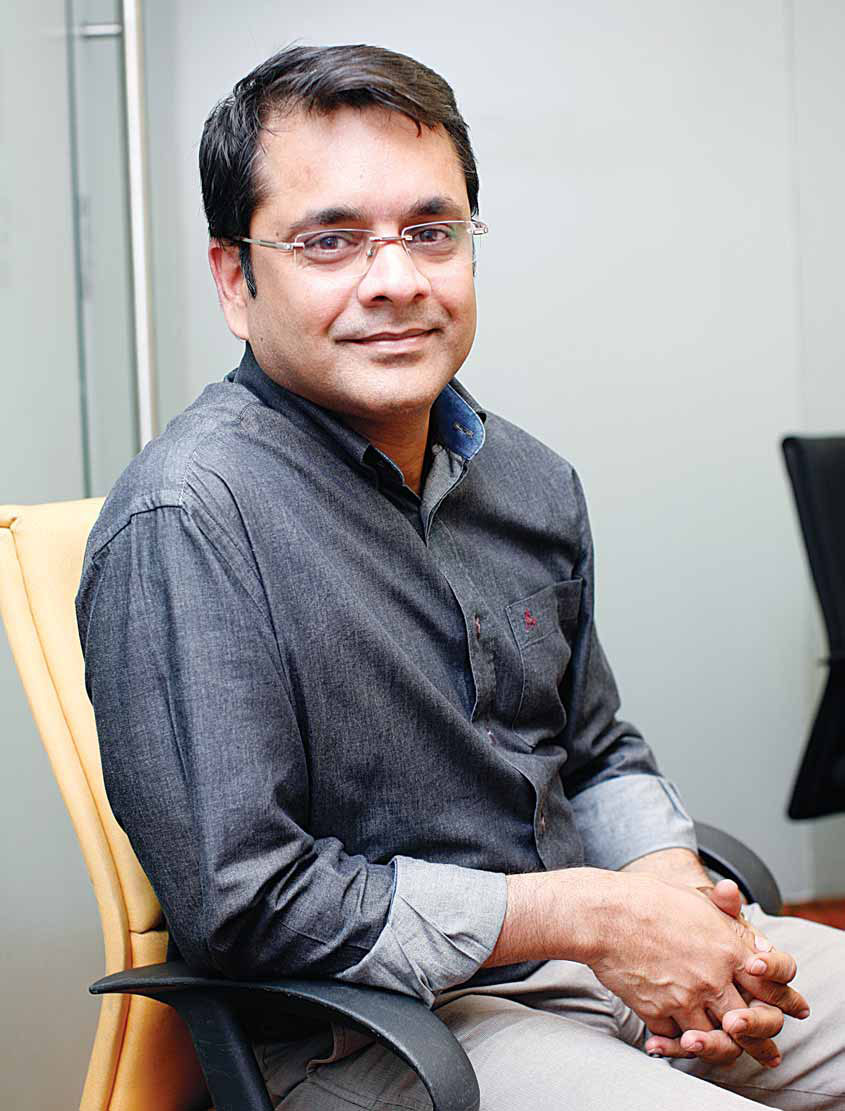
Anshula Srivastava, Global Head & General Manager HR for Organisation capability at Wipro, and Yuvaraj Srivastava, Chief Human Resource Officer for MakeMyTrip.com are a sterling example of a successful couple who have found a fine work-life balance, who exemplify that harmony exists where there is freedom, respect and space for each other
Their love blossomed in college in Allahabad and seven years later culminated in marriage in 1993. However, even aft er wedlock, they both had to wait for four years to be finally together, thanks to Army life. Now, both of them are corporate leaders in their own right, steering the growth of many a young corporate manager under their able leadership. But more importantly, ensuring that their marriage and family life with parents and their son, Tushnim, is full of cheer and happiness. Indeed, Anshula and Yuvaraj Srivastava are a made-for-each-other couple, going by the freedom, respect and space they have given to each other.
Anshula is the Global Head Organisation Capability & General Manager HR at Wipro, for one of the business units, while Yuvaraj is the Chief Human Resource Officer for MakeMyTrip. Both of them are charming and affable and their pretty home in Noida reflects their warmth and energy. So, how did they meet? States Anshula, “We were a group of boys and girls in college and we were all great friends. I found Yuvaraj to be a fun loving person and very down-to-earth, besides being good looking. He proposed to me but I wasn’t very sure at that time, as I thought if I got married I may have to compromise on my career. But he assured me that he would support me, and so did both our families. Th at made me agree to his proposal.”
‘You have to know the specific needs of this generation and the young corporate managers. Firstly, they don’t want to be micromanaged. If you provide an environment where they are not micro-managed and they are left independent, they deliver their best.’
Anshula too supported Yuvaraj firmly when he decided to join the Army. While Yuvaraj says that she came forth with the strongest support for his Short Service Commission career in the Army, it also hastened the process of marriage to her, as he got “settled” at the young age of 21. After seven years of courtship, they got married in 1993 but, says Anshula, “Soon after that he got posted to Srinagar and we had to stay separately for over three years. There were times when I got worried reading news articles about Kashmir. I feared for him, as Srinagar in those days was a dangerous place. However, we used to talk regularly over the phone and I used to be reassured
In fact, the separation helped Anshula to pursue her MBA in Allahabad, aft er she graduated in Psychology. She further states, “We were very young at that point of time. We were very happy that he got through, and it all happened very fast. He was initially posted near Jhansi and then in Srinagar for three years, which was a non-family station. I was studying that time and I would often travel to Srinagar during vacations to meet him. At that time, married couples were allowed to stay together in a shared accommodation. Once he got posted to Dehradun, then I moved there to stay with him. I have always aspired to work, and he has supported me.’’
Anshula comes from a family which believes in women’s empowerment. Says Anshula, “My parents had a mixed marriage. Both were Academicians and worked in several engineering colleges in different cities. My parents were fairly evolved in their thinking. They were forward looking and nontraditional. Yuvaraj’s family is fairly traditional, where men are men and women are women. Yuvaraj is traditional at heart and relationships are important for him.”
So, is their marriage Utopian, where no arguments take place? Says Anshula frankly, “One has to allow for difference of opinion in a marriage. One has to respect the partner’s opinion. Th at doesn’t mean that couples can’t fight. They do, but so do siblings. You don’t give up on relationships because of fights. We are individuals from different backgrounds, and we have to respect our differences.’’
One has to allow for difference of opinion in a marriage. One has to respect the partner’s opinion. That doesn’t mean that couples can’t fight. They do, but so do siblings. You don’t give up on relationships because of fights. We are individuals from different backgrounds, and we have to respect our differences - Anshula
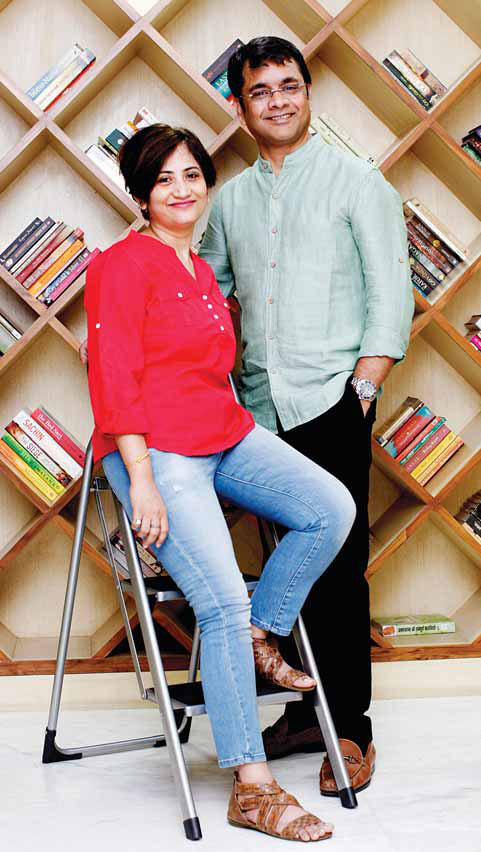
Who calls the shots at home? Says Anshula, with a broad smile, “I think it’s me. Not that he doesn’t, but I generally take more decisions.” She is not too fond of cooking, but that’s okay with Yuvaraj, who quickly went to the kitchen and guided the cook to serve us a quick meal as it was dinner time when we met Anshula at their home.
Their home life revolves around Tushnim, their 14 year old son, who, Anshula says, wants to become a scientist, sometimes a footballer. So, how do they manage his upbringing despite their busy schedules? Reveals Anshula, “When I conceived, we had decided that I would be the lenient one and Yuvaraj would be the strict one, but it turned out to be the opposite. In the heat of anger parents tend to get upset with the child and both of them pile on to him/ her. We follow the thumb rule of one person at a time. When one of us gets angry, the other tries to not lose temper.’’
So, who is the perfectionist between the two? Says Anshula, “I am bit of a perfectionist…that’s because I was brought up to believe that my benchmark should be myself. Th e management principles I use in office in terms of organizing, planning and execution, apply to home as well. “A place for everything and everything in its place” is the best way of managing home.
Regarding Tushnim, Anshula proudly says, “for a child, the parents are the two people they can depend on. My son is mature, though somewhat disorganized as kids are. He is upright, well informed and intelligent. And also has an independent view point. We keep learning from him. I have taught him to do what is right, irrespective of who is involved and value of money. For a child he is disinterested in worldly goods. “No moh maya”
Although both of them are busy corporate managers, they use technology to communicate with each other. For example, when they decided to build a house in Noida, Anshula says, “Yuvaraj was in Mumbai when we started construction. We would coordinate on email regarding decisions on design. We wanted a sleek, elegant house with straight line, nothing ostentatious, and that’s what we built, and we love it.’
What advice would she like to give women corporate managers? Says Anshula, “ I have had an easy run so far, may be because I work in a very evolved organization. I once told Yuvaraj I treat people based on their merit, and not their gender. I have worked and completed as a professional and not as a women. In office we are all professionals, so gender does not matter.
But, yes women professionals end up working harder they have balance between home and family. Those are real challenges. Corporate India is still not equipped to support women employees wholeheartedly. Flexi timings and other initiatives have a long way to go before they get more widely implemented. The whole mindset towards women professionals need to change. Corporates will do big service if they bridge the gap between society’s patriarchal mindset and modern aspirations.’’
So, who is the better HR Manager between the two? Anshula analyses thus: “Yuvaraj is a very good HR leader. His exceptional attitude, very good interpersonal connect with all sorts of people, his high energy and diverse experience make him great at his job. He deserves to be where he is. It is a result of his hard work.
“As for me, I conceptualize and create, find solutions to problems, am very comfortable working in ambiguity…a combination of thought and business leadership. I have the ability to take people along and build credibility with the business. A colleague once said that I don’t have hidden agendas and am transparent in my interactions, which obviously helps.’
It has been the longest stint for Anshula at Wipro as she has been working there for the last ten years. Says she, “Wipro is a great organization to be in. I have value connect with Wipro…. leaders in Wipro walk the talk. We are a down to earth organization… when Wipro says it cares, it does care.’’
Do they go for holidays often, considering that Yuvaraj is in MakeMyTrip now? Says Anshula, “There have been times when I managed to take leave with great difficulty, and then plans got cancelled at the last moment. I love travelling, so it does irk me sometimes. Unfortunately, my in-laws are ailing right now, and we need to keep them in mind when we plan holidays.
Adds Yuvaraj, “Yes, she has been complaining about not going for holidays regularly. Since I joined MakeMyTrip, we have gone on two trips to Europe and to Bhutan.’’
What is the philosophy of life that she lives by? States Anshula candidly, “Be honest with yourself, for one cannot lie to oneself. My father advised me to always be a good human being, although it sounds cliched. One should never do something that one might regret later. I always listen to my inner voice.’’
For Anshula, her leisure time is spent in reading and she has an impressive library carved out for herself at home. Her future plans include, “Creating co-operatives for dyeing arts in textiles and weaving where artists are involved in a profit sharing model. I also want to pursue a PhD in Criminal Psychology,’’ she signs off .
Indeed, the Srivastava couple give a fine example of achieving work and life balance, where success balances with love and understanding
BY VINITA DESHMUKH